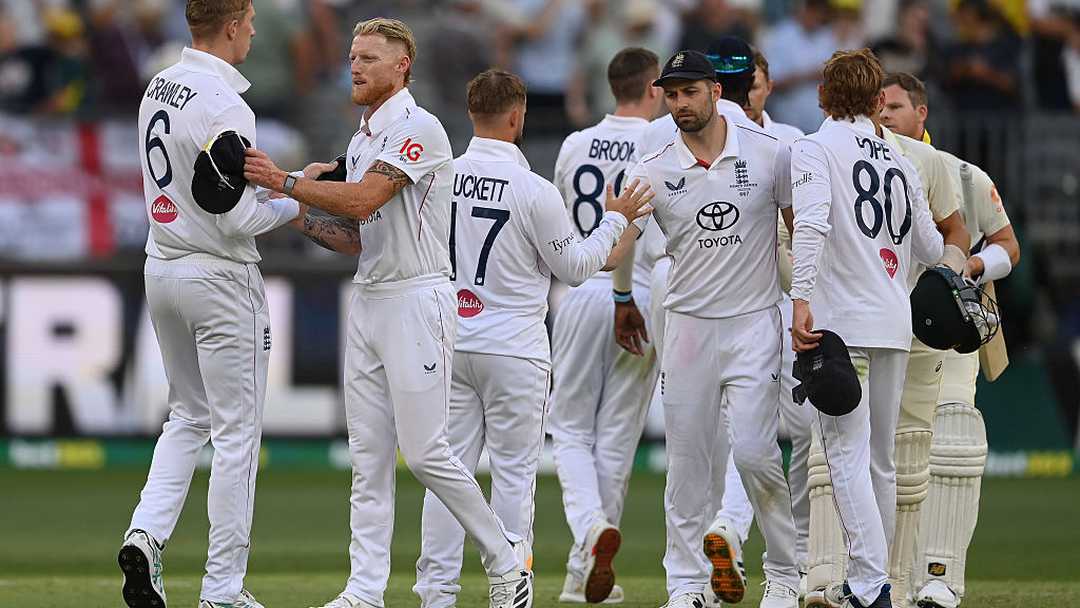
McCullum warns England against overreacting to Perth setback
England coach Brendon McCullum has acknowledged there will be "hurt" and "chatter" after his team's chastening loss to Australia in Perth. England looked set to rack up a substantial fourth-innings target before collapsing and handing over the advantage, and McCullum said the challenge now was not just recovering from defeat but also ensuring the result doesn't damage the team's confidence or direction.
"We've been trying to insulate against reacting too strongly. We know it'll hurt, not just us but all the people who follow this cricket team as well," McCullum told TNT Sports after England lost by eight wickets to cap the shortest Ashes Test since the start of the 20th century.
"There will be a lot of chatter. For us it's about making sure we don't allow our confidence and our camaraderie to dip too low. We know that at our best we're a very good cricket team. We've now got an extended amount of time off to get ready for Brisbane. We've done it before."
McCullum tipped his hat to Travis Head, who surged to a 69-ball century and made a target of 205 look insignificant on a surface where as many as 30 wickets fell in five sessions of play. He reiterated that England believed 200 was defendable and that Head's counterattack changed the equation.
"I thought 200 was a good score for us to try to defend," McCullum said. "The way Travis Head played was absolutely outstanding. It's one of the best knocks I've ever seen in a pressure situation on a tough wicket. He knocked us off our lengths. We wanted to try to hold length as long as we possibly could but he put us under so much pressure that we couldn't do it.
"I spoke to Adam Gilchrist just before the last innings and he said, 'I think you guys have got 30 too many.' We might have needed another 230 the way Travis played. If someone delivers a performance like that, you have to tip your cap. Yes, we'll look at how we can control things better if that confronts us again, but you've got to acknowledge how special a knock that was, especially as he was out of position as well. I thought it was a brave call from the Australian captain and coach. Clearly they wanted to make the ball soft as soon as possible. He was superb."
England had controlled large portions of the match, including taking a first-innings lead of 40 and were well positioned at 65/1 in their second innings. But Scott Boland, expensive earlier in the Test, found the perfect length and forced a collapse. Reeling at 88/6, England never recovered, bowled out for 164 after facing just 34.3 overs, following 32.2 in the first innings.
"I thought Boland bowled exceptionally well, he hit the deck hard and his paces were up," McCullum said. "We were on top of him in the first innings so (it was impressive) the way he came back at a pivotal moment: we were 100 ahead and only one down so that was the time for us to start to try and manoeuvre the game into our favour."
Australia also targeted the channel outside off stump, tempting England's attacking middle order of Ollie Pope, Joe Root and Harry Brook into errors. All three played at balls they could have left and paid the price. McCullum said he wants his players to continue putting pressure on the opposition, but stressed the importance of flexibility in approach and recognizing when to throttle up or down.
"In the end we nicked a couple of wide balls and chopped on. Some of our high-quality players, our freewheeling cricketers, weren't able to put pressure back on the opposition. Instead we found ourselves in a bit of a slump. That's something we'll have to look at again. But I never want us to go away from our style, putting opposition teams under pressure gives us our best opportunity to win games," McCullum said.
"Yes, there are times when we have to throttle down and times when we have to power up. But the basic principle of how we operate as a team is to put pressure on the opposition. And I'll stress: I thought 200 was a good score until Travis Head played the way he did.
"We'll let the dust settle tonight and then map out a plan (for the next two weeks) and decide whether some guys (get some time in the middle). This has come quickly and we're disappointed, but we're strong believers in what we're doing."
Despite the defeat, McCullum said there were positives, particularly the pace and aggression shown by England's seamers early in the Test.
"The first innings was as good a fast-bowling performance as I've seen in the time I've been in the job. We wanted to hit Australia with hostility and pace, and it showed what is possible. We probably didn't have enough downtime to hit them again with the same hostility in the second innings."

